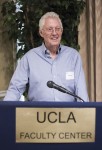Hairs have grayed and voices have gotten thicker, but the memory of their time in India was fresh in the minds of the alumni at the UCLA Faculty Center on Sunday.
About 200 University of California alumni and their family members reunited at UCLA over the weekend to celebrate a recently published book called “Project India: How College Students Won Friends for America.”
Project India was a student-led program at UCLA, UC Santa Barbara and UC Riverside during the 1950s and 1960s that brought students to India at a time when few Americans lived in the country, said David Lund, a UCLA alumnus. During the 10- to 12-week trip, students lived with Indian college students, volunteered in schools and spoke to Indian students about the U.S.
The program, which started at UCLA, aimed to give people in India a better sense of American culture in response to U.S. leaders’ concerns about the Soviet Union’s influence and communism in other nations, Lund said. About 200 UCLA students participated in the program.
The U.S. Department of State was initially hesitant about funding the program because the department doubted that students could influence diplomatic relationships between countries, Lund said. A few years after the program started, however, the Department of State provided financial support for the program to help shield India from the influence of communism.
With donations from former U.S. politician and philanthropist Winthrop Rockefeller, Lund helped organize the project and went to India as one of the first project participants. Other universities, including Stanford University and UC Berkeley, developed similar programs after Project India launched.
Project India ended in 1969, two years after the U.S. Department of State stopped funding trips.
At the event on Sunday, Judith Graven, the book’s author and a UCLA alumna who participated in the project, talked about the book and why she decided to write down the story of the students’ trips. She said she decided to author the book after attending the reunion for the 57th anniversary of the project’s founding in 2009.
“If we didn’t hurry up and write the book, (memories) would be gone,” Graven said.
Attendees said they want others to remember the project because individuals who went on the trips are aging. Some former participants have died in recent years, leaving other alumni to carry their memories for them.
“This is probably our last hurrah,” said Alan Rosin, a UCLA alumnus who went on a trip in the mid-1950s.
Students who embarked on the trips became congressmen, rabbis, professors and ambassadors, among other occupations. But the connections they made through Project India tied them together, reuniting them through numerous anniversary events and trips.
In some cases, the friendships led former project participants to partake in personal events in each others’ lives.
“The leader of the group didn’t like me initially,” said Richard Hemenez, who went on the 1960 trip. “But eventually, I became a best man at his wedding.”
The project also prompted participants to engage in experiences and ideas they had never expected or thought about before.
When the students traveled to India, they witnessed some of the effects of the country’s then-high poverty rate.
“It was like seeing the real world for the first time,” Lund said.
When the American students visited India, they also faced questions from Indian students, who had different ideas of what American students look like. Naidu Permaul, an Indian American who went on the trip, said Indian administrators often would try to prevent him from speaking to Indian students.
“(Indian students) didn’t imagine me as an American,” Permaul said.
Permaul said he had to be candid when students asked him about racial segregation in the U.S. Although groups for the trip were diverse, some alumni at the event said the trip reshaped their understanding of the American identity.
“You leave India not seeing race anymore,” Lund said.
For Rosin, the trip reshaped his life as a student at UCLA. After the trip, Rosin said he came to consider questions about segregation in America and disparities in wealth around the world.
Eventually, Rosin dropped out of UCLA, saying he struggled to deal with professors who he thought would prevent him from learning about controversial topics.
“I didn’t think a UCLA education was going to help answer the questions I had in India,” Rosin said.
